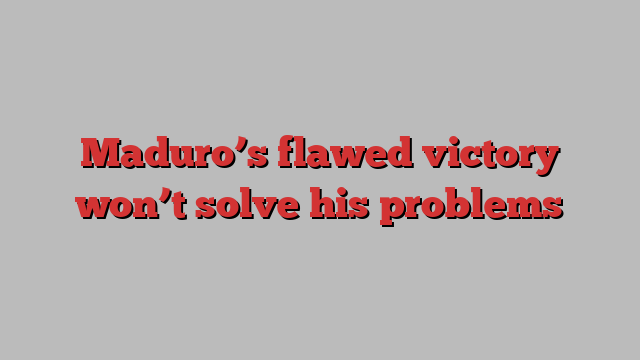
Unlock the Editor’s Digest for free
Roula Khalaf, Editor of the FT, selects her favourite stories in this weekly newsletter.
In the tense days leading up to Sunday’s presidential election, Venezuelans gamed out ever more elaborate scenarios for the outcome. In the end, the result was the simplest and most predictable: the South American country’s authoritarian leader Nicolás Maduro was declared the winner, while the opposition cried foul.
Few will be convinced by Maduro’s victory. Opinion polls and unofficial quick counts had predicted a landslide opposition win. There was a long silence from the state-controlled election authority after polling closed, followed by the declaration of an “irreversible” triumph for the president, without any breakdown of numbers. Then rapid congratulations from key allies Russia, China and Cuba and threats against those who questioned the result.
“In the face of high voter participation and strong support for the opposition, the Maduro regime had two options,” said Ryan Berg, director of the Americas programme at the Center for Strategic and International Studies in Washington. “Admit defeat . . . or engage in a fraud to the extent we haven’t seen in Venezuela before.” The statement of victory “indicates the path for which he has opted: mega-fraud and potential repression of street protests”, he said.
The opposition had mounted its most serious challenge yet to Maduro’s 11-year rule. It united behind a single candidate, ran a highly effective insurgent campaign on social media and deployed tens of thousands of volunteers to act as witnesses at voting stations. Yet most of the witnesses were sent away without the official printed final tally of votes to which the law entitles them and opposition leaders were reduced to questioning the result.
Maduro had already tilted the playing field heavily before the vote, banning the main opposition leader María Corina Machado, directing state-controlled media to ignore the opposition and using state resources to buy support. But as his gap with Machado’s surrogate candidate Edmundo González grew, the bus driver and union activist appears to have opted for what one analyst in Caracas called his “red nuclear button”.
“The government’s results strain credulity, not just because they defy serious public opinion surveys leading up to the election but also because they imply that people would freely re-elect a president who had overseen an economic disaster of the scale of Venezuela’s,” said Christopher Sabatini, senior fellow for Latin America at Chatham House, referring to the loss of three-quarters of the country’s output under Maduro.
Maduro’s contested election victory will not solve his biggest problems: a lack of international recognition, sanctions from the US, EU and UK and legal cases against him and his inner circle.
Instead the flawed result presents the Biden administration with a dilemma. Keen to stem the flow of Venezuelan refugees towards the US border and to improve the supply of oil to global markets after Russia’s invasion of Ukraine, Washington had bet heavily on a strategy of inducing Maduro to hold a competitive election in return for sanctions relief, an approach that now lies in tatters.
International investors will be disappointed. Many had hoped that the election might accelerate a process of gradual recovery from the economic collapse of the past decade, during which oil production cratered and one in four of the population emigrated. That now looks unlikely.
Criticism is unlikely to bother Maduro unduly — his previous election victory in 2018 was also declared bogus by the west. His key allies Russia, China, Cuba and Iran will stand by him.
The only thing he might fear is his own people and it remains to be seen whether they have the stomach for another fight. If not, what was once one of Latin America’s wealthiest nations may go the way of Cuba and Nicaragua and stop even holding competitive elections in future.